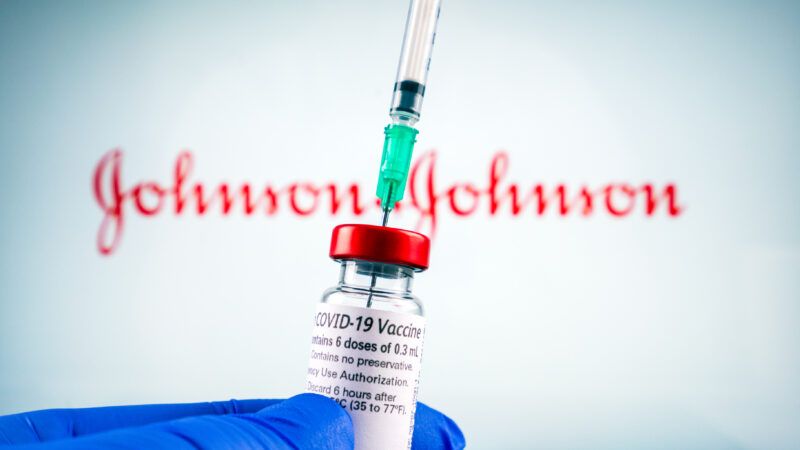The FDA's Decision To Pause J&J Vaccination Will Kill People
The risks of blood clots are much lower than the risks of COVID-19 illness, hospitalizations, and deaths.

The U.S. Centers for Disease Control and Prevention (CDC) and the Food and Drug Administration (FDA) issued a statement today "recommending a pause in the use" of Johnson & Johnson's COVID-19 vaccine. The agencies took this step "out of an abundance of caution" based on six cases of a rare blood clot disorder in people who had been inoculated with the one-dose vaccine. There have been six cases out of 6.8 million people who have already been inoculated with the vaccine. The blood clot incidents all occurred in women between the ages of 18 and 48. Those odds amount to one in 1.13 million, which is comparable to your annual chances of being struck by lightning (1 in 1.22 million).
For comparison, a November 2020 meta-analysis in The Lancet found that more than one in five very ill hospitalized and post-mortem* COVID-19 patients experienced venous thromboembolism—that is, blood clots in their veins. A 2010 study in the Journal of American Preventive Medicine reported that the annual incidence of thromboembolism between the ages of 15 and 44 was about 1.5 cases per 1,000 people. In addition, the risk of blood clots from taking oral contraceptives is about 1 in 1,000 annually.
A March 2021 study in Science reports that more than 70 percent of new COVID-19 infections have been driven by Americans between the ages of 20 and 49. The faster that people in that age group get vaccinated, the less likely it is that other Americans who remain unvaccinated or immunocompromised will become infected.
Unfortunately, many states have declared that they are following the pause recommendation from these federal agencies. Officials in the Biden White House have declared that the pause in the rollout of the Johnson & Johnson vaccine "will not have a significant impact on our vaccination plan." The New York Times notes, however, that instead of being able to deliver enough doses by the end of May to cover 260 million Americans, the pause will result in only enough for health authorities to fully vaccinate 230 million.
Before the Johnson & Johnson pause was announced, the good news has been that COVID-19 vaccine hesitancy among Americans had been steadily dropping. Interestingly, some public health experts apparently believe that the pause will increase Americans' confidence in the COVID-19 vaccines. For example, FDA Vaccine Advisory Committee member Dr. Paul Offit tells Forbes that the pause "should be largely reassuring" because it shows the agencies are "still looking" to determine possible side effects even after the vaccine was approved.
Offit's optimism seems dubious given that public confidence in the Oxford/AstraZeneca COVID-19 vaccine plunged according to a YouGov poll, after various European governments paused its distribution in March over reports of similarly rare anomalous post-vaccination blood clotting incidents. The good news is that public confidence in the safety of the Pfizer/BioNTech and Moderna vaccines remained steady among Europeans.
By focusing on the not-yet-proven, very low risk of blood clots versus the known risks of the increased misery, hospitalizations, and deaths that the Johnson & Johnson vaccine would have prevented, our overly cautious public health bureaucrats will likely cause more sickness and deaths among Americans than would otherwise have occurred.
* CORRECTION: This article originally misstated the findings of the Lancet study, which focused on blood clots in hospitalized COVID-19 patients, not on blood clots in all COVID-19 patients.


Show Comments (162)